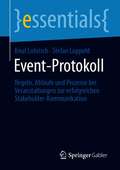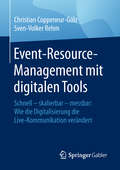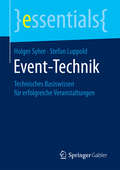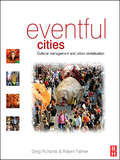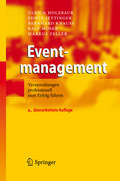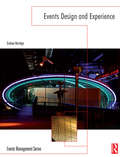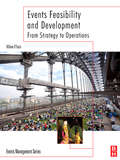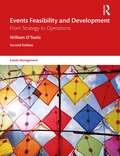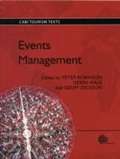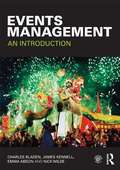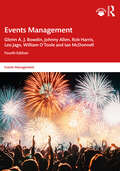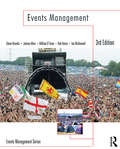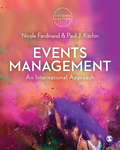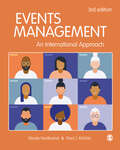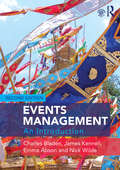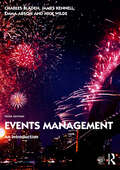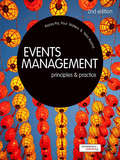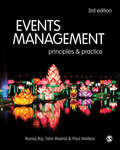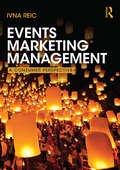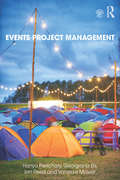- Table View
- List View
Event-Protokoll: Regeln, Abläufe und Prozesse bei Veranstaltungen zur erfolgreichen Stakeholder-Kommunikation (essentials)
by Stefan Luppold Knut LohrischKein Event ohne Protokoll! Was meist nur als Etikette und Placement bekannt ist, trägt entscheidend zum Erfolg bei Veranstaltungen bei. Der richtige Umgang mit Stakeholdern ist gerade in der Live Communication ein wesentliches Element, um die beabsichtigte Wirkung erzielen zu können. Es muss in der Organisation und Planung verankert sein, bei der Durchführung als wahrnehmbare Wertschätzung, als erkennbare Gastgeber-Kultur positioniert werden. Ob nun als Corporate Protocol institutionalisiert oder mit den entsprechenden Kompetenzen als Bestandteil der Unternehmenskommunikation: Event-Protokoll ist Stakeholder-Management.
Event-Resource-Management mit digitalen Tools: Schnell – skalierbar – messbar: Wie die Digitalisierung die Live-Kommunikation verändert
by Christian Coppeneur-Gülz Sven-Volker RehmDieses Buch erklärt, wie die vielfältigen Möglichkeiten der Digitalisierung die Live-Kommunikation sowie das Management von Events noch besser machen. Es stellt dar, wie man die Stärken der Live-Kommunikation unterstreicht, die Schwächen abmildert, die Chancen intensiver nutzt und Risiken vermeidet.Wie aber kann Modernisierung bei einem so individuellen und von zwischenmenschlicher Kommunikation geprägten Format gelingen? Die Autoren haben dazu ein hilfreiches, praxistaugliches Set von Erfolgsfaktoren im Event-Management entwickelt, um einen messbaren Optimierungsprozess für die Live-Kommunikation zu ermöglichen. In einer wissenschaftlich begleiteten Studie wurde geklärt, wie sich die Einführung eines webbasierten Event-Managements auf diese Erfolgsfaktoren auswirkt – mit spannenden Ergebnissen.Zahlreiche Praxisbeispiele, Handlungsempfehlungen zur Implementierung eines webbasierten Eventmanagements sowie ein Ausblick auf das Event-Management der Zukunft runden dieses Werk ab.
Event-Technik: Technisches Basiswissen für erfolgreiche Veranstaltungen (essentials)
by Stefan Luppold Holger SyhreHolger Syhre und Stefan Luppold beschreiben in diesem essential die wesentlichen technischen Elemente, die den Erfolg von Events durch Licht-, Ton-, B#65533;hnen- und Medien-Technik bestimmen. Die Autoren erl#65533;utern die vielf#65533;ltigen Sparten der Veranstaltungs- und Produktionstechnik, welche bei Veranstaltungen zum Einsatz kommen k#65533;nnen. Event-Technik erfordert ein grunds#65533;tzliches Verst#65533;ndnis der potenziellen Gewerke, das den Lesern in kompakter Form zug#65533;nglich gemacht wird.
Eventforschung: Events und ‚The New Normal' (Markenkommunikation und Beziehungsmarketing)
by Cornelia ZangerLive, digital und hybrid - Das New Normal steht für die Integration analoger und digitaler Kanäle. Die Beiträge in diesem Konferenzband gehen auf die erfolgreiche Verknüpfung von Medien im Umgang mit den aktuellen Herausforderungen in einem pandemischen Umfeld ein. Vor diesem Hintergrund zeigen Forscher und Branchenexperten Trends und Strategien der Event- und Messewirtschaft im Umfeld der Krise auf, beleuchten hochaktuelle Themen zur Nachhaltigkeit und diskutieren die zukünftigen Entwicklungen der Veranstaltungsbranche in den bevorstehenden Monaten und Jahren. Die Beiträge in diesem Tagungsband bieten vielfältige Handlungsempfehlungen für die Branche und geben Impulse für Forschung und Wissenschaft.
Eventful Cities
by Robert Palmer Greg RichardsProcesses of globalization, economic restructuring and urban redevelopment have placed events at the centre of strategies for change in cities. Events offer the potential to achieve economic, social, cultural and environmental outcomes within broader urban development strategies.This volume:* analyzes the process of cultural event development, management and marketing and links these processes to their wider cultural, social and economic context* provides a unique blend of practical and academic analysis, with a selection of major events and festivals in cities where ‘eventfulness’ has been an important element of development strategy* examines the reasons why different stakeholders should collaborate, as well as the reasons why cities succeed or fail to develop events and become eventful Eventful Cities evaluates theoretical perspectives and links theory and practice through case studies of cities and events across the world. Critical success factors are identified which can help to guide cities and regions to develop event strategies. This book is essential reading for any undergraduate or graduate student and all practitioners and policy-makers involved in event management, cultural management, arts administration, urban studies, cultural studies and tourism.
Eventmanagement
by Ulrich Holzbaur Markus Zeller Bernhard Knauß Edwin Jettinger Ralf MoserEvents sind Veranstaltungen mit Erlebnischarakter. Eventmanagement beschäftigt sich mit der Frage, was ein Event auszeichnet, wie man es realisiert und wie man eine Veranstaltung einzigartig macht. Das Buch führt in die Grundlagen des Eventmanagements ein - von der strategischen Planung bis zur operativen Durchführung und Steuerung. Dafür tragen die Autoren ihre Erfahrungen aus den verschiedenen beruflichen Bereichen zusammen. Ausgearbeitete Beispiele aus der Praxis sowie Checklisten und Formblätter helfen bei der sicheren Planung und Organisation.
Eventpsychologie: Veranstaltungen wirksam optimieren: Grundlagen, Konzepte, Praxisbeispiele
by Steffen RonftDie Psychologie ist eine gut erforschte wissenschaftliche Disziplin, die sich intensiv mit der Vorhersage von menschlichem Verhalten beschäftigt. Davon profitiert auch die Eventbranche.Dieses Buch zeigt, wie sich Psychologie im Eventkontext anwenden lässt: von der Optimierung kommunikativer Konzepte, der Erlebnisforschung und -gestaltung, der Erhöhung der Sicherheit bis hin zu psychologischen Komponenten diverser Veranstaltungsformate und -tätigkeiten. Insgesamt 60 renommierte Autorinnen und Autoren schildern sowohl wissenschaftliche Erkenntnisse als auch die praktische Umsetzung und liefern Antworten unter anderem auf folgende Fragen: Welche multisensorischen Wege gibt es, um Teilnehmende stärker zu überzeugen? Wie kann Neuroscience für Events angewandt werden? Wie können psychologische Methoden das Eventmanagement bei der Arbeit unterstützen?Die Expertinnen und Experten liefern die wichtigsten aktuellen Erkenntnisse für Veranstalter, Eventlocations und Dienstleister der Eventbranche sowie für alle Unternehmen, die mit gelungenen Veranstaltungen nachhaltig erfolgreich sein möchten.
Events Design and Experience (Events Management)
by Graham BerridgeFor the first time Events Design and Experience draws together the relationship between event design and the experience of consumers and participants. It explores and analyses the event experience of the individual and how this can be ‘controlled’ by design.By drawing upon ongoing research conducted over several years into the experiences of groups and individuals who attend events this text will ask questions such as: What was the rationale behind a particular event being designed in a certain way? What was the actual experience of consumers? How was the event materially delivered and did the experience created provide a satisfactory outcome? How can experiences be understood (via semiotics) especially the physical elements of an event?Structured in four sections, Events Design and Experience discusses:* What are events? An overall view of the industry, its definitions and market demand. It also covers an analysis of previous literature, and draws upon real life events such as Wembley plc, Leapfrog Corporate events and the British Cycling federation* What is an event experience? An explanation of the nature and stages of experience, and the emergence of the experience industry itself. Cases such as the Proms, London Fashion week ands the Nike Fun run are used to illustrate.* Designing Experiences. Considers how design itself can impact upon the experience, in some cases fundamentally changing the nature of experience. It asks the question of how experiences are designed and what do they signify to the customer once complete.* Analysing Event Experiences. Considers how experiences can be analysed and evaluated looking at the artificiality of the event and how this reflects in the experience of consumers. Also includes a review of the psychological processes of perception and interpretation and how meaning and experience can be analysed, and how we may begin to unravel the meanings attributed to certain events. With international case studies throughout, Events Design and Experience has a coherent user-friendly structure including chapter summaries, review exercises and topics for discussion to consolidate understanding.
Events Feasibility and Development (Events Management)
by William O'TooleEvents Feasibility and Development: From Strategy to Operations answers two fundamental questions faced by all events planners and organizers: how do I justify this event to the client? and why are we spending money on this event?. With a user-friendly learning structure containing bullet points, questions and exercises and international case studies (Australian Taxation Office, Saudi Arabian events returns, Fuji-Xerox events), Events Feasibility and Development: From Strategy to Operations looks at issues such as: the process of creating a feasibility study events forecasting models and cost/benefit analysis types of events (exhibitions, sports, festivals) and their benefits and returns project management tools for measuring return on investment. Companion website: www.eventsfd.com -- contains videos, colour photos and a list of related resources.
Events Feasibility and Development: From Strategy to Operations (Events Management)
by William O'TooleEvents Feasibility and Development: From Strategy to Operations 2nd Edition outlines the best practice in event development and the global events sector. Tools and techniques from the first edition have been refined and expanded through their use in over 20 countries, including the USA, France, UAE, Malaysia and South Africa. These include strategy development and implementation, asset management, portfolio management, return on investment, management process mapping and the feasibility study. Fascinating current examples illustrate these professional management techniques. The second edition elaborates on the events sector maturity model as a measurement tool for cities, regions and countries. This has been tried and successfully tested in developing economies and assisted in the rapid development and sustainability of events in Dubai and many other destinations. Each chapter contains exhibits, questions, bullet points and clear explanations of the tools and techniques. Brand new material includes: A full explanation of the maturity model including post-pandemic solutions New case studies and exhibits A new section on teaching and training in event management The chapters are fully supported by further current case studies and examples on the publisher’s and the author’s website. Online material also includes 11 lesson plans for a semester course, containing assessment items, learning objectives and teaching tips for each topic, and event photos and author videos explaining the topics. This will be essential reading for all students of Event Management.
Events Management
by Peter Robinson Christine Roberts Crispin Dale Debra Wale Steve Gelder Caroline Wiscombe Ade Oriade Sine Heitmann Andrew Ridal Ghislaine Povey Geoff DicksonEvent management studies are fast growing in popularity, covering a diverse range of activities such as music and film festivals, concerts, sporting events and conferences. This textbook gives a broad and practical coverage of the major themes in events. Outlining both the historical developments and current state of the industry, whilst also taking into account wider political and cultural issues, the book covers the different elements of planning, project management, health and safety, funding, operations, human resources, marketing and logistics that are vital for successful management. Critical issues such as impacts, sustainability and legacy of events are also discussed. Supported by international case studies and review questions, Events Management provides a current and up-to-date view of the industry in this field.
Events Management
by Emma Abson Nick Wilde James Kennell Charles BladenContemporary events management is a diverse and challenging field. This major new introductory textbook is the first to fully explore the multi-disciplinary nature of events management and to provide all the practical skills and professional knowledge students need to succeed in the events industry. The book covers every type of event studied on an Events Management course, including sports, music, the arts, corporate events, tourism, and the public and voluntary sectors. It introduces the key issues facing the contemporary events industry, from health, safety and risk management to sustainability to developing a market-oriented business, with every topic brought to life through case-studies, personal biographies and examples of best practice. Written by a team of authors with many years of industry experience, it introduces the practical skills required in every core area of events management, including marketing, finance, project management, strategy, operations, event design and human resources. A companion website for the book includes a dazzling array of additional features, including self-test questions, audio interviews with key industry figures, additional case-studies and PowerPoint slides for each chapter. Events Management: An Introduction is the essential course text for any events management program.
Events Management (Events Management)
by Leo Jago Rob Harris Ian McDonnell William O'Toole Johnny Allen Glenn A. BowdinA must-have introductory text of unrivalled coverage and depth focusing on events planning and management, the fourth edition of Events Management provides a complete A to Z of the principles and practices of planning, managing and staging events. The book offers a systematic guide to organising successful events, examining areas such as event design, logistics, marketing, human resource management, financial planning, risk management, impacts, evaluation and reporting. The fourth edition has been fully updated and revised to include content covering technology, including virtual and hybrid events, concepts such as social capital, soft power and events, social inclusion, equality, accessibility and diversity, and the latest industry reports, research and legal frameworks. The book is logically structured and features new case studies, showing real-life applications and highlighting issues with planning events of all types and scales in a range of geographical locations. This book has been dubbed ‘the events management bible’ and fosters an interactive learning experience amongst scholars of events management, tourism and hospitality.
Events Management (Events Management)
by Rob Harris Ian McDonnell William O'Toole Glenn Bowdin Johnny AllenEvents Management is the must-have introductory text providing a complete A-Z of the principles and practices of planning, managing and staging events. The book: introduces the concepts of event planning and management presents the study of events management within an academic environment discusses the key components for staging an event, covering the whole process from creation to evaluation examines the events industry within its broader business context, covering impacts and event tourism provides an effective guide for producers of events contains learning objectives and review questions to consolidate learning Each chapter features a real-life case study to illustrate key concepts and place theory in a practical context, as well as preparing students to tackle any challenges they may face in managing events. Examples include the Beijing Olympic Games, Google Zeitgeist Conference, International Confex, Edinburgh International Festival, Ideal Home Show and Glastonbury Festival. Carefully constructed to maximise learning, the text provides the reader with: a systematic guide to organizing successful events, examining areas such as staging, logistics, marketing, human resource management, control and budgeting, risk management, impacts, evaluation and reporting fully revised and updated content including new chapters on sustainable development and events, perspectives on events, and expanded content on marketing, legal issues, risk and health and safety management a companion website: www.elsevierdirect.com/9781856178181 with additional materials and links to websites and other resources for both students and lecturers
Events Management: An International Approach
by Mr Paul James Kitchin Nicole FerdinandTaking an explicit international approach to the subject, Events Management combines theory and practice to address the challenges and opportunities of working in a global world to help prepare students for the realities of the events management sector. Written by a high profile international team of editors and contributors, the text features cases spanning Europe, Africa, Asia, Australia and North America, and covers key topics and issues such as fundraising, sponsorship, globalization and sustainability. Furthermore, it aims to bolster student employability through the inclusion of pedagogical features such as practical asides, case studies, and a "Diary of an Events Manager" to give students a window into the real life of a practitioner. Brand new to the Second Edition: Three new chapters covering industry-related contemporary developments in social media, events tourism and the future of international events New case studies in every chapter illustrating real-life and diverse practical applications of each topic Updated theory about the critical global issues affecting events and the main drivers of change in the industry A Companion Website featuring links to interactive learning resources, an Instructors manual for lecturers, events-related videos for fun additional educational viewing, and author-selected SAGE journal articles for advanced learning. Suitable for courses in Events Management and International Events Management.
Events Management: An International Approach
by Mr Paul James Kitchin Nicole FerdinandTaking an explicit international approach to the subject, Events Management combines theory and practice to address the challenges and opportunities of working in a global world to help prepare students for the realities of the events management sector. Written by a high profile international team of editors and contributors, the text features cases spanning Europe, Africa, Asia, Australia and North America, and covers key topics and issues such as fundraising, sponsorship, globalization and sustainability. It also aims to bolster student employability through the inclusion of features such as practical asides, case studies, and a "Diary of an Events Manager" to give students a window into the real life of a practitioner. Brand new to the Second Edition: Three new chapters covering industry-related contemporary developments in social media, events tourism and the future of international events New case studies in every chapter illustrating real-life and diverse practical applications of each topic Updated theory about the critical global issues affecting events and the main drivers of change in the industry A Companion Website featuring links to interactive learning resources, an Instructors manual for lecturers, events-related videos for fun additional educational viewing, and author-selected SAGE journal articles for advanced learning. Suitable for courses in Events Management and International Events Management.
Events Management: An International Approach
by Nicole Ferdinand Paul J. KitchinTaking an explicit international approach to the subject, Events Management combines theory and practice to address the challenges and opportunities of working in a global world to help prepare students for the realities of the events management sector. Written by a high profile international team of editors and contributors, the text features cases spanning Europe, Africa, Asia, Australia and North America, and covers key topics and issues such as fundraising, sponsorship, globalization and sustainability. It also aims to bolster student employability through the inclusion of features such as practical asides and case studies to give students a window into the real life of a practitioner. Brand new to the third edition: - An in-depth examination of the implications of Covid-19 for international events, including sponsorship arrangements, risk management and future job prospects for events management graduates - Two brand new chapters covering developments in digital marketing and accessible events management - Case studies featuring India, Australia, Peru, Europe, UK and USA and covering events such as music festivals, Holi, Mardi Gras as well as mega events such as the Olympics - Updated theory about the critical global issues affecting events and the main drivers of change in the industry - A companion website featuring links to interactive learning resources, an Instructors manual for lecturers, events-related videos for fun additional educational viewing, and author-selected SAGE journal articles for advanced learning. Suitable for courses in Events Management and International Events Management.
Events Management: An International Approach
by Nicole Ferdinand Paul J. KitchinTaking an explicit international approach to the subject, Events Management combines theory and practice to address the challenges and opportunities of working in a global world to help prepare students for the realities of the events management sector. Written by a high profile international team of editors and contributors, the text features cases spanning Europe, Africa, Asia, Australia and North America, and covers key topics and issues such as fundraising, sponsorship, globalization and sustainability. It also aims to bolster student employability through the inclusion of features such as practical asides and case studies to give students a window into the real life of a practitioner. Brand new to the third edition: - An in-depth examination of the implications of Covid-19 for international events, including sponsorship arrangements, risk management and future job prospects for events management graduates - Two brand new chapters covering developments in digital marketing and accessible events management - Case studies featuring India, Australia, Peru, Europe, UK and USA and covering events such as music festivals, Holi, Mardi Gras as well as mega events such as the Olympics - Updated theory about the critical global issues affecting events and the main drivers of change in the industry - A companion website featuring links to interactive learning resources, an Instructors manual for lecturers, events-related videos for fun additional educational viewing, and author-selected SAGE journal articles for advanced learning. Suitable for courses in Events Management and International Events Management.
Events Management: An Introduction
by Emma Abson Nick Wilde James Kennell Charles BladenContemporary events management is a diverse and challenging field. This introductory textbook fully explores the multidisciplinary nature of events management and provides the student with all the practical skills and professional knowledge they need in order to succeed in the events industry. It introduces every core functional area of events management, such as marketing, finance, project management, strategy, operations, event design and human resources, in a vast array of different event settings from sport to political events. This new edition has been updated to include: • New and updated content on developments in technology, risk management and event volunteering. • New and updated case studies that include emerging economies. • New industry voices by international practitioners. Every topic is brought to life through vivid case studies, personal biographies and examples of best practice from the real world of events management. Written by a team of authors with many years’ experience of working in the events industry, Events Management: An Introduction is the essential course text for any events management programme.
Events Management: An Introduction
by Emma Abson Nick Wilde James Kennell Charles BladenContemporary events management is a diverse and challenging field. This introductory textbook fully explores the multidisciplinary nature of events management and provides the student with all the practical skills and professional knowledge they need to succeed in the events industry. It introduces every core functional area of events management, such as marketing, finance, project management, strategy, operations, event design and human resources, in a vast array of different event settings from sport to political events. This new edition has been updated to include: New and updated content on technological developments in events such as virtual/hybrid events, artificial intelligence, virtual/augmented reality, holograms in music events, software for event planning and projection mapping. New content on eSports, the sustainability sector, employability skills, policy changes, diversity and inclusion, ethics and responsibility in events, and contemporary event safety and security issues including the threat of terrorism. New and updated case studies that cover a wider range of regions. A fully updated and extended companion website that includes web and video links, quizzes and a case study archive for students, as well as PowerPoint slides for instructors and a brand-new instructor manual full of teaching strategy ideas. Every topic is brought to life through vivid case studies, personal biographies and examples of best practice from the real world of events management. Written by a team of authors with many years’ experience of working in the events industry, Events Management: An Introduction is the essential course text for any events management programme.
Events Management: Principles and Practice
by Razaq Raj Paul Walters Mr Tahir RashidThe new edition of this popular accessible text gives students a thorough and contemporary grounding in both the fundamentals and strategic responsibilities of successful event management. Purposefully broad in scope, the text combines theory with practical knowledge and terminology, ensuring readers develop a flexible and commercially-acute skill set. <P><P> Topics covered range from law, marketing and finance to introductory guides to sound, lighting and multimedia equipment, providing students with the practical knowledge they need for a career in Events Management. Theory is brought to life in a range of case studies and examples throughout the text. <P> As well as updated examples and legislation, this edition introduces new chapters on:<P> * Event entrepreneurship<P> * Project management and financing<P> * New Multimedia technology for events organisers<P> * Sustainable festivals and events<P> * Long term legacy and impacts<P> * The future of the industry<P> An accompanying Companion Website provides students with discussion questions and video links. The website also provides an Instructor's Manual and PowerPoint slides for lecturers. <P> This text is an ideal resource for undergraduate students who are studying Events Management for the first time. <P> Visit the Companion Website at www.sagepub.co.uk/raj
Events Management: Principles and Practice
by Razaq Raj Paul Walters Tahir RashidEvents Management provides an introductory overview of the fundamentals in managing events from conception to delivery, highlighting both the theoretical and operational aspects, to prepare students for a career in events management and hospitality. Now in its Third Edition, the authors have included new chapters on Crowd Control and Crowd Dynamic; Expos, Conferences and Conventions; Brand Co-creation and Social Media, and have added new content on contemporary trends like the environmental and social impact of large scale events such as the Olympics. International case studies covering all manner of events are used throughout and include: · The impact of the London 2012 and Rio 2016 Olympic Games · Van Gogh Augmented Reality in Nuenen · Sands EXPO and Convention Center, Las Vegas · Glastonbury Music Festival · Lame Horse Night Club, Russia · The Leeds Caribbean Festival PowerPoint slides and an Instructor Manual can be found online. Suitable for Events Management students at Undergraduate and Postgraduate level.
Events Management: Principles and Practice
by Razaq Raj Paul Walters Tahir RashidEvents Management provides an introductory overview of the fundamentals in managing events from conception to delivery, highlighting both the theoretical and operational aspects, to prepare students for a career in events management and hospitality. Now in its Third Edition, the authors have included new chapters on Crowd Control and Crowd Dynamic; Expos, Conferences and Conventions; Brand Co-creation and Social Media, and have added new content on contemporary trends like the environmental and social impact of large scale events such as the Olympics. International case studies covering all manner of events are used throughout and include: · The impact of the London 2012 and Rio 2016 Olympic Games · Van Gogh Augmented Reality in Nuenen · Sands EXPO and Convention Center, Las Vegas · Glastonbury Music Festival · Lame Horse Night Club, Russia · The Leeds Caribbean Festival PowerPoint slides and an Instructor Manual can be found online. Suitable for Events Management students at Undergraduate and Postgraduate level.
Events Marketing Management: A consumer perspective
by Ivna ReicThis textbook provides students with an essential introduction to the theoretical underpinnings and practicalities of managing the marketing of events. In order to market events effectively, it is vital to consider marketing of events from the organiser’s perspective and to link it to that of the consumers attending events. As such, this is the first book on the topic which reflects the unique characteristics of marketing in the Events industry by exploring both sides of the marketing coin – the supply and the demand – in the specific context of events. The book takes the reader from core marketing mix principles to exploring the event marketing landscape to consumer experience and involvement with event marketing and finally strategies and tactics employed to manage the marketing activities related to events. The use of technology, importance of sponsorship and PR are also considered. International case studies are integrated throughout to show practical realities of marketing and managing events and a range of useful learning aids are incorporated to aid navigation throughout the book, spur critical thinking and further students’ knowledge. This accessible and comprehensive account of Events Marketing and Management is essential reading for all students and future managers.
Events Project Management
by Hanya Pielichaty Georgiana Els Ian Reed Vanessa MawerThis book provides events management students with an accessible and essential introduction to project management. Written by both academics and industry experts, Events Project Management offers a unique blend of theory and practice to encourage and contextualise project management requirements within events settings. Key questions include: What is project management? How does it connect to events management? What is effective project management within the events sector? How does academic theory connect to practice? The book is coherently structured into 12 chapters covering crucial event management topics such as stakeholders, supply chain management, project management tools and techniques, and financial and legal issues. Guides, templates, case study examples, industry tips and activity tasks are integrated in the text and online to show practice and aid knowledge. Written in an engaging style, this text offers the reader a thorough understanding of how to successfully project manage an event from the creative idea to the concrete product. It is essential reading for all events management students.
